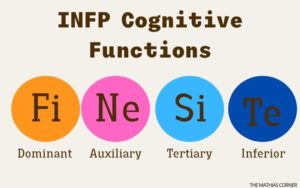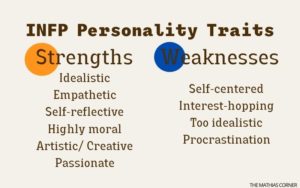Understanding INFP personality is quite a paradox since INFPs are actually one of the most misunderstood personality types. People see them as kind and gentle, yet people are unaware of their constant battles against themselves.
You could’ve met an INFP and wondered what’s going on in their heads. Don’t worry, we don’t even understand ourselves sometimes. But since you’re here now, let’s take this opportunity to dive deeper within INFP. I’ll try to provide you with an INFP personality summary to give you a few insights.
What is INFP?
INFP is one of the rarest personality types among the 16 Myers-Briggs personalities. It comprises only 4 to 5 percent of the population. Because of their love for fantasies and dreamlands, INFPs are often called “Dreamers”. Aside from that, they’re also known as Idealists and Mediators because of their kind, creative, and imaginative nature.
For those who are new to Myers-Briggs personality types, INFP basically means Introverted-iNtuitive-Feeling-Prospecting. If you’re not sure about being an INFP, you might want to check the following signs.
The Myers-Briggs Personality Type Indicator aims to identify an individual’s key characteristics, strengths, and preferences. This can help us learn more about ourselves. As an INFP myself, the MBTi was an eye-opener. Understanding your preferences, motivation, and cognitive processes helped me unleash my potentials better.
Isabel Myers, together with her mother, Katherine Briggs developed the MBTi questionnaire based on Carl Jung’s personality type theories.
According to the Myers-Briggs personality type, we can evaluate ourselves by the following aspects:
- How we recharge our energy
- How we view the world
- Decision-making process
- Our approach towards work
- Our confidence
Again, the following aspects don’t necessarily mean it’s better than the other. It just describes an individual’s chief preferences which would help them to understand themselves better.
Our Energy
How do you recharge your energy? Do you prefer to have alone time or do you choose to socialize with others?
Introversion (I) Vs. Extroversion (E)
Introversion means too much stimulation like noise, and crowds drain your energy. To cope with this trait, your chief preference is to recharge in calm and quiet places. Contrary to the popular misconception, while introverts regain energy from being alone, many are still capable of socializing and possess great communication skills.
Extroversion means your energy is regained from social interactions and lively places. Extroverts choose to hang out with friends or involve themselves in outdoor activities. They don’t need to be in quiet places to regenerate their energy. Socializing with their family and friends is enough to fill in their batteries.
Our Perspective
How do you take in information? Do you prefer actual experiences or abstract concepts?
Intuitive (N) Vs. Sensing (S)
Intuitive types love seeing the big picture through concepts and abstract theories. They are visionaries who can connect and predict situations just by processing theoretical ideas. They are often future-oriented and zoom out on the bigger plan.
Sensing Types are people who focus on their surrounding’s current situation. They prefer living in the present and focus on what’s already happened, instead of relying on abstract ideas. Sensing types are detail-oriented and prefer situations that satisfy their body senses.
Decision-making Process
Do you decide depending on facts or do you lean on your emotions?
Thinking (T) Vs. Feeling (F)
Thinking Types prefer to use facts, logic, and analytical reasoning in their decisions. They tend to tuck away their emotions and choose logical reasons in order to accomplish their task.
Feeling Types are much more sensitive to people’s emotions. Their decisions lean on what their hearts desire despite it being irrational. They are empathetic and care for other people’s feelings.
Our Approach
Do you prefer a well-structured schedule or more flexibility in your work hours?
Judging (J) Vs Prospecting (P)
Judging Types are well-organized and prefer following a strict schedule. They value the structure and predictability of events. They prefer committing to their plans until they accomplish their tasks.
Prospecting Types are spontaneous and love the flexibility in work and schedules. Strict and structured routines work less effectively on them. They are prone to last-minute changes and love to keep their options open.
Confidence
Are you a perfectionist or do you go with the flow?
Turbulent (T) Vs. Assertive (A)
Turbulent Identities tend to be perfectionists in their work. They push themselves to do better and strive hard for growth. They are sensitive to stress and always aim for success.
Assertive Types are more free-flowing. They accept mistakes and failure lightly and prevent themselves from drowning in stress. They dislike pressuring themselves and would prefer a stress-free way to accomplish tasks.
INFP Cognitive Functions
Here’s how INFP cognitive process looks like. Dominant function: introverted Feeling (Fi), Auxiliary Function: extraverted iNtuition (Ne), Tertiary Function: introverted Sensing, Inferior Function: extraverted Thinking

Dominant Function: Introverted Feeling (Fi)
The dominant function represents what a personality type prioritizes the most during mental processes. For INFPs, introverted Feeling is their primary and most dominant function.
Introverted Feeling represents how an INFP spotlights their thoughts inward. This comes in the form of moral standards and values. Whenever an INFP faces a situation, their first-hand thinking is whether the situation or idea suits their beliefs and values.
For example, when a friend asks an INFP to lie for them, INFP would immediately check how such action fits with their moral standards. When the idea negates their beliefs, it would be strenuous for anyone to make them do it. INFPs are morality and values junkies.
Auxiliary Function: Extraverted iNtuition
Extraverted iNtuition works as the second chief preference in INFP’s cognitive process.
Intuition signifies a focus on abstracts, theories, and concepts. Since INFPs have extraverted iNtuition as their second function, it means they love gathering information from the external world and connecting the dots until it makes sense for them.
INFPs love to read and gather new information. They are voracious readers and always dig deeper than what is presented. This is the reason why INFPs are keen on evaluating people’s human behavior. They want to make sense of people’s gestures, which leads to predicting their future courses of action. This makes them great empaths that understand human reasoning and subjectivity.
Tertiary Function: Introverted Sensing
Introverted Sensing is the 3rd INFP personality cognitive function. It intertwines an individual’s personal experiences. Whenever INFPs need to complete a task, their principal reference is their previous experiences.
This is why INFPs tend to be traditional in their way of things. Once they experience a procedure that works for them, they stick to it. They have tendencies to do the same method over and over again.
Being attached to an old method makes learning new skills difficult for an INFP. However, with consistent practice and effort to change their traditional ways, they can become significantly good and competitive at anything.
Inferior Function: Extraverted Thinking
Extraverted Thinking relies on the logical and empirical data taken from the tangible world. But for INFPs, they utilize this function the least.
In most cases, INFP understands logical reasoning. However, emotions guide their decision-making to the point that they can overlook rational choices just because “they don’t feel right” about it. This is how Extraverted Thinking works as an inferior.
INFP Personality Traits
Aside from their cognitive processes, here’s more about INFP. Generally, people see INFPs as kind, soft, and compassionate people. However, INFPs can shine brightly aside from these obvious descriptions. Here are the INFP strengths and weaknesses:

Strengths
Idealistic
INFPs are natural idealists. Their minds are constantly reeling about future plans, storylines, and scenarios. In their minds, they could idealize perfection which makes them great visionaries that could guide a dramatic change to today’s society.
Empathetic
Reading on someone’s emotions allows INFPs to predict the course of their actions. Since they have a knack to understand human subjectivity, they tend to empathize better than other personality types. They are also known as “Healers.”
Self-reflective
INFPs are in search of deeper meaning in everything they do. For them, everything has a purpose and a lesson we can reflect on.
Highly moral
INFPs uphold honesty and loyalty. They value their reputation the most and would always consult their moral standards before doing any action.
Artistic/ Creative
INFPs express their vision, imagination, and creativity through language and arts. Since many INFPs aren’t great verbal communicators, they put their thoughts into writing, paintings, or even in theatrical performances.
Passionate
INFPs are passion-driven. They need to stay true to what their hearts desire. If they do, rest assured that they will bear amazing fruits.
You may also like: 6 Best INFP Traits and Hidden Behaviors
Weaknesses
The following INFP personality weaknesses could vary depending on every individual. However, you may find the majority of INFPs struggling with the following traits:
Self-centered
Since INFPs always live inside their heads, they frequently overthink their actions and their way of thinking. Oftentimes, it leads them to become self-critical and excessive self-consciousness.
Interest-hopping
For INFPs, acquiring new information easily leads them to jump from one interest to another. They love trying new things. While this makes them knowledgeable and jacks-of-all-trades, too many interests eventually lead to a loss of focus.
Too idealistic
INFPs can draw the perfect picture inside their heads. However, there’s a thin line that separates reality and fantasies. Unfortunately, when INFPs are too drawn with their own idealism and perfection, they lose interest in what happens in the real world.
Procrastination
“Project starters but not finishers.” Because some INFPs are perfectionists, unpassionate or unmotivated,INFP procrastination kicks in and they tend to prolong or halt whatever project they’re doing.
You may also like: 8 INFP Weaknesses and How to Turn Them to Your Advantage
INFP Personality Career Paths
Many people have stereotyped INFPs to become a writer or psychologists. While these career paths could actually be a good fit, there’s still a lot of factors to consider when an INFP seeks a career.
It’s not a secret that INFPs tend to be multi-talented. Since new information easily piques their interest, they dive into different hobbies which results in confusion when choosing the right career path. Many INFPs feel so lost about the right job for them. Three months in and they’ll start to wonder, “Is this really the right job for me?”
Now, here’s how an INFP should look for the perfect job:
First and foremost, the “dream job” we always wanted doesn’t necessarily mean “the job” that suits our personality. Worse, the job we always dreamt of may actually leave us lost and confused. So how should INFPs find a good career for themselves?
More about this: INFP Career: Finding the Right Job for INFP
Instead of fantasizing about jobs, INFP personality best jobs require an understanding of our core values.
You see, my father was an engineer. As a child who looks up to his father, I dreamt to be an engineer, too. I loved imagining myself working in a company with an “Engr.” attached to my name. But when I first took my steps in this field, a few things started to change. I realized how the little details on being an engineer don’t resonate with me. I like the idea, but not the work itself.
In short, I tried to change careers once again. This is an example that our “dream job” isn’t always “the job” for us.
So, as an INFP, how do you prevent yourself from choosing the wrong job?
Everything starts to go right when you know your core values. As for me, here are a few things that I need to be satisfied with within a job. My core values I can’t negotiate with:
- Honesty
- Flexible hours
- Independence
- Less social interaction
- Good pay
It took me a hella lot of years to find out about these values. When I was younger, I was curious about everything so I always start working jobs with enthusiasm.
I had an experience with sales. I delved into it because I imagined myself becoming a millionaire by selling products. However, as I experience selling products I don’t believe in, it scrapped one of my biggest values – honesty. A few months later, I left the job because I can’t compromise with honesty.
I also realized that I work best when I don’t have to please other people. Daily socialization is a task for me. And instead of focusing on my work, my attention splits between doing my job and pleasing co-workers.
So as I experience different jobs, I learned my strengths and weaknesses. As of now, I found these core values in my current job as a writer. Writing at home satisfies many of my core values. When I try to look at other career paths, I just start shaking my head and know deep inside that if I ever change careers again, I’d repeat the cycle of filing a 2-week notice within 6 months.
So there you go. Before you decide on a career path, you must learn what you can and can’t suck up. For example, if you decide to be a psychiatrist to help people in therapies, so be it. But don’t forget that these jobs also include analytic work and it could be very routine. Would that be okay for you? Consider that one, too.
Another INFP personality career? Becoming an educator can be a good job for INFPs. I loved it, too. I enjoy motivating other people. However, the introvert in me often gets tired of trying to accommodate my students one by one.
So, as an INFP, you should consider these situations that lie behind your “ideal job”.
But anyway, if you’re looking for some concrete choices, here are a few jobs you could consider:
- Writer or Author
- Psychologist
- Therapist
- Social Worker
- Educator
- Photography
- Guidance Counselor
INFP Personality Facts
Still curious about INFPs? Here’s more of what to know about INFP:
- INFPs are good at learning foreign languages as they can hear diction, grammar, and tone with precision and insights. (MBTI® Manual)
- Many great authors are INFPs such as Antoine de Saint-Exupery, Edgar Allan Poe, and J.R.R. Tolkien.
- Although INFPs are creative, they often lean on conventional jobs that aren’t in line with their true aspirations. Therefore, they are often unsatisfied with their careers. “Performing the opposite activities from what one likes may be creating the tension that leads them to lower levels of satisfaction overall.” (MBTI® Manual)
- New Zealand has the highest population of INFP which covers 4.2% of the INFP population.
- INFPs are less likely to suffer from chronic pain and heart diseases.
- Most INFP hobbies lean on introverted activities which leads them to isolate themselves.
That’s it! Hope this INFP Personality Guide helps you interact with INFPs. And if you’re an INFP, too, then I hope this benefits you in understanding yourself better.


